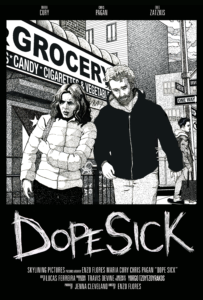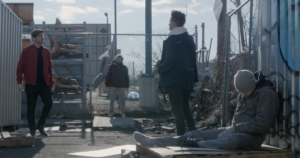
Short Film Review “Dope Sick”
NO TRAILER CURRENTLY AVAILABLE
First, the Recap:
There is the shadowy phantom of addiction. Hurtling with a frenetic momentum away from the healthier side of those things which we have genuine, creative, and constructive passions for, it instead becomes an all-consuming force that constantly begs to be fed–no matter what the cost to the ones found caught in its inexorable, wholly damaging web of supposed “need” and “gratification” being offered. It can tear apart anyone at any time, even the kinship of family. Morgan (Maria Cury) is homeless and in dire straits while seeking out her next heroin fix. Teamed up with a fellow junkie named Harman (Greg Zatzkis), circumstances arise that cause her to make a decision that will alter the very course of not only her own wayward life, but that of her equally lost but ultimately well-meaning brother Irving (Christopher Pagan) and their already uncertain futures.
Next, my Mind:
Unfaltering, uncomplicated, bluntly truthful, eerily relevant, and displaying keen societal awareness in its intent, drug addiction-centric premise, character-driven narrative, and highly multi-cultural setting contained within the neighborhood of Bushwick, New York, this 17-minute short film effort from Brazilian-born now New York-based writer/director/producer Enzo Flores paints the all-too-real portrait of the demon that is heroin and its insidious impact on any and all who’ve chosen to be involved with it, whether user or dealer. Having recently been accepted as a selection for both the NewFilmmakers NY and Golden Door International film festivals, there’s no denying just how necessary it is that films addressing this oft-portrayed subject manner are being put out there for the public to take in and ponder, seeing as the drug is bound by no race or creed, but infects all who get trapped into its realm of life-crushing dependency and, honestly, enslavement.
Deftly utilizing the skills acquired through his Screen Studies BA-degree earning efforts at The New School: Eugene Lang College for the Liberal Arts while also forming the first nationwide Film & Visual Arts Honor Society, Pi Tau Epsilon, Flores doesn’t pull any punches, providing the viewer with a totally in-your-face-from-the-start dive into the withdrawal-riddled, reality-addled world of heroin addicts and the desperate acts they will stoop to in order to gain that next sense of “release” the drug’s fix delivers. But, what then gives the film an even more potent core essence is its additional emphasis on how its hold over those craving it ends up taking over one immigrant family’s existence, even if from opposite ends of the spectrum of complicity as hinted at above, while finding a way to destroy all they hold dear and rip apart a close familial bond once shared, now clouded in a haze of needles and money.
Likewise, the grander image of a community on the brink and those who are actually slowly being displaced and driven from the places they call home brings to mind the whole effect of modernization and reconstruction of a given neighborhood as seen here, and it therefore begs the questions about the real ramifications this brings to any and all, regardless of skin color or ethnic background. The narrative does a solid job at looking at this aspect of events while not being preachy or overtly demonstrative about it, but rather approaches the concepts being presented in a way that should absolutely have an influence on the viewer, but in a way that allows for true consideration of all the ideas seen and, ideally, create an atmosphere of deeper, more resolute awareness to the harrowing consequences experienced in the world of heroin, delivered with harshly reverberating series of events and a finale that assuredly leaves its mark.
Visually the film literally feels like a reality show in that the raw candidness the lens brings out of the myriad of characters it embraces very much provides the sense of desperation and volatility found in the arena of drug use and trafficking while also shining the spotlight on the brutal actualities heroin represents, making you very much experience the nuances of each individual’s tale as well as the greater whole. It’s one of those excellent facets of indie cinema and the narrative and character-based focus it always leans towards. Cury undertakes her role as Morgan with an inner fury and palpable vulnerability paired with a heartbreakingly realistic manner of drug-fueled forlornness, illustrating a woman on the edge who’s only objective now is to get high no matter what it takes. The act she commits in order to score that next release brings about a painful realization for the viewer that certainly indicates how far she’s fallen and separated from anything resembling common sense or even an inking of who she’s hurting in the process.
It’s a vivid look at just how terribly the drug overtakes it’s “host”, and Cury embodies all the pain, muddled viewpoint of life, and other associated ramifications of addiction with beautifully executed, affecting poise. Zatzkis also displays to full effect the harrowed mindset and sole obsession to seek more “escape” from reality and the apparent torture of non-drug-induced consciousness through his role as Harman, a fellow junkie and friend to Morgan who also tries his level best to assist in scoring their “needed” trip. So overtly unaware of what reality is, his steps associated with helping Morgan get there takes a decidedly dire turn, but will he even truly notice or have actual cognizance of the fallout, and that’s what makes the character so achingly desolate in his addiction, well-played throughout by Zatzkis. Then there’s Pagan as Morgan’s brother Irving, a young man filled with true intentions when it comes to caring for his family who’s struggling to survive and hold itself together. Pushed into the life of dealing heroin for the local supplier, doggedly trying to keep up with the growing demand, his journey is filled with at least some hope of making good out of a bad situation, though unbeknownst to him, he’s losing more than he even realizes.
It’s a straightforward role that Pagan takes on with youthful vigor and a solidly believable demeanor that both makes you root for Irving’s redemption but likewise be saddened by what truths could end up destroying him in the end, trapping him where he’s at, potentially a pawn to greater forces forever. Primary supporting turns are made by Gabriel Peña as the local drug kingpin/supplier Domingo, who’s hold over all who serve him is absolute and made consistent through intimidation and fear, Luiz Sena as Domingo’s right hand man/enforcer Francisco, and Evan McFarland as Jefferson, one of Domingo’s other dealers who’s had ongoing business transactions thanks to fulfilling the growing needs of the neighborhood’s junkies like Harman and Morgan. In total, “Dope Sick” is an impactful, essential, authentically unapologetic glimpse into the fundamental tragedy of heroin and its bitter effects on the world through a taste of the melting pot that is America and why we need to put aside our differences in order to aid those who are being so drastically transformed by a real, ever-expanding problem–fellow human beings.
As always, this is all for your consideration and comment. Until next time, thank you for reading!




